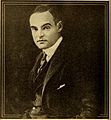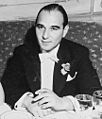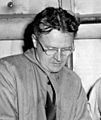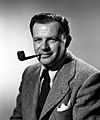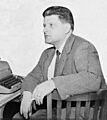Academy Award for Best Adapted Screenplay facts for kids
Quick facts for kids Academy Award for Best Adapted Screenplay |
|
|---|---|
| Presented by | Academy of Motion Picture Arts and Sciences (AMPAS) |
| Country | United States |
| First awarded | 1929 |
| Currently held by | Peter Straughan, Conclave (2024) |
The Academy Award for Best Adapted Screenplay is a special Oscar given to the writer of the best movie screenplay that was based on a story that already existed. This means the movie's story came from another source, like a novel, a stage play, a TV show, or even another movie.
When a movie is a sequel, its screenplay is also considered an adaptation. This is because it's based on the story and characters from the first film. This award has been given out since the very first Academy Awards ceremony.
Contents
Award Records and Fun Facts
Over the years, many talented writers have won this award. Some have even won it more than once! Here are some interesting facts about the winners.
Writers with Multiple Wins
- Joseph L. Mankiewicz was the first person to win this award twice. He won in 1949 and 1950, two years in a row.
- Others who have won twice include Robert Bolt, Francis Ford Coppola, Mario Puzo, Alvin Sargent, and Christopher Hampton.
- Michael Wilson also won twice. However, he was blacklisted during his second win, so someone else accepted the award for him. The Academy later officially gave him credit for the win.
Winning for Different Types of Screenplays
Some writers are so skilled they have won Oscars for both adapted screenplays and original screenplays (stories not based on any previous work). These writers include Billy Wilder, Paddy Chayefsky, Francis Ford Coppola, and the Coen brothers.
Family Winners
This award has also seen family members win.
- Brothers Philip G. Epstein and Julius J. Epstein won together for the classic film Casablanca.
- Brothers James Goldman and William Goldman both won, but for different movies.
- The Coen brothers, Joel and Ethan, are another pair of winning siblings.
- Two married couples have won this award. The first was Sarah Y. Mason and Victor Heerman for Little Women. The second was Peter Jackson and Fran Walsh for The Lord of the Rings: The Return of the King.
Special Achievements
- Frances Marion was the first woman to win an Oscar for writing. She won for her original script for The Big House.
- Sarah Y. Mason was the first woman to win for an adapted screenplay.
- Geoffrey S. Fletcher became the first African-American to win in any writing category for his script for Precious. Later, Barry Jenkins and Tarell Alvin McCraney were the first African-American writing team to win for Moonlight.
- James Ivory is the oldest person to win this award. He was 89 years old when he won for Call Me by Your Name.
- Emma Thompson is the only person who has won an Oscar for both acting and for writing this award for Sense and Sensibility.
- Taika Waititi was the first person of Māori descent to win the award, for the film Jojo Rabbit.
Notable Nominees
Many famous writers have been nominated for this award, even if they didn't win. These include well-known authors and playwrights like George Bernard Shaw, Tennessee Williams, Arthur Miller, and Kazuo Ishiguro.
It's not just dramas that get nominated. Some fun and different types of films have also been recognized.
- The writers of Shrek and Toy Story 3 were nominated for their work on these animated movies.
- The writers of Logan were the first to be nominated for a movie based on superhero comic books.
Multiple Wins and Nominations
Multiple wins
|
Three or more nominations
|
Age Records
| Record | Writer | Film | Age |
|---|---|---|---|
| Oldest winner | James Ivory | Call Me by Your Name | 89 years, 270 days |
| Oldest nominee | 89 years, 230 days | ||
| Youngest winner | Charlie Wachtel | BlacKkKlansman | 32 years |
| Youngest nominee | Joseph L. Mankiewicz | Skippy | 22 years, 236 days |
Images for kids
-
Howard Estabrook won for Cimarron (1931).
-
Victor Heerman co-won for Little Women (1933).
-
Sarah Y. Mason co-won for Little Women (1933).
-
Sidney Howard won the award after his death for Gone with the Wind (1939).
-
Julius J. Epstein co-won for Casablanca (1943).
-
Billy Wilder co-won for The Lost Weekend (1945).
-
Robert E. Sherwood won for The Best Years of Our Lives (1946).
-
John Huston won for The Treasure of the Sierra Madre (1948).
-
Joseph L. Mankiewicz won the award two years in a row, first for A Letter to Three Wives (1949) and then for All About Eve (1950).
-
Paddy Chayefsky won for Marty (1955).
-
John Farrow co-won for Around the World in 80 Days (1956).
-
S. J. Perelman co-won for Around the World in 80 Days (1956).
-
Carl Foreman co-won for The Bridge on the River Kwai (1957).
-
Alan Jay Lerner won for Gigi (1958).
-
Richard Brooks won for Elmer Gantry (1960).
-
Ring Lardner Jr. won for M*A*S*H (1970).
-
Francis Ford Coppola co-won the award twice, first for The Godfather (1972) and then for The Godfather Part II (1974).
-
Mario Puzo co-won the award twice, first for The Godfather (1972) and then for The Godfather Part II (1974).
-
William Peter Blatty won for The Exorcist (1973), an adaptation of his novel of the same name.
-
Bo Goldman co-won for One Flew Over the Cuckoo's Nest (1975).
-
William Goldman won for All the President's Men (1976).
-
Alvin Sargent won the award twice, first for Julia (1977) and then for Ordinary People (1980).
-
Oliver Stone won for Midnight Express (1978).
-
Costa-Gavras co-won for Missing (1982).
-
James L. Brooks won for Terms of Endearment (1983).
-
Peter Shaffer won for Amadeus (1984).
-
Ruth Prawer Jhabvala won the award twice, first for A Room with a View (1986) and then for Howards End (1992).
-
Bernardo Bertolucci co-won for The Last Emperor (1987).
-
Michael Blake won for Dances with Wolves (1990), an adaptation of his novel of the same name.
-
Emma Thompson won for Sense and Sensibility (1995).
-
Billy Bob Thornton won for Sling Blade (1996).
-
Curtis Hanson co-won for L.A. Confidential (1997).
-
John Irving won for The Cider House Rules (1999), an adaptation of his novel of the same name.
-
Akiva Goldsman won for A Beautiful Mind (2001).
-
Philippa Boyens co-won for The Lord of the Rings: The Return of the King (2003).
-
Peter Jackson co-won for The Lord of the Rings: The Return of the King (2003).
-
Fran Walsh co-won for The Lord of the Rings: The Return of the King (2003).
-
Alexander Payne co-won the award twice, first for Sideways (2004) and then for The Descendants (2011).
-
William Monahan won for The Departed (2006).
-
The Coen brothers won for No Country for Old Men (2007).
-
Geoffrey S. Fletcher won for Precious (2009); first Black winner in this category.
-
Aaron Sorkin won for The Social Network (2010).
-
John Ridley won for 12 Years a Slave (2013).
-
Adam McKay co-won for The Big Short (2015).
-
Barry Jenkins co-won for Moonlight (2016).
-
Tarell Alvin McCraney co-won for Moonlight (2016).
-
James Ivory co-won for Call Me by Your Name (2017).
-
Spike Lee co-won for BlacKkKlansman (2018).
-
Taika Waititi won for Jojo Rabbit (2019).
-
Sian Heder won for CODA (2021).
-
Sarah Polley won for Women Talking (2022).
See also
 In Spanish: Anexo:Óscar al mejor guion adaptado para niños
In Spanish: Anexo:Óscar al mejor guion adaptado para niños
- Academy Award for Best Original Screenplay
- Golden Globe Award for Best Screenplay
- BAFTA Award for Best Adapted Screenplay
- Independent Spirit Award for Best Screenplay
- Critics' Choice Movie Award for Best Screenplay
- List of Big Five Academy Award winners and nominees
- List of Academy Award–nominated films
- Writers Guild of America Award for Best Adapted Screenplay
 | Delilah Pierce |
 | Gordon Parks |
 | Augusta Savage |
 | Charles Ethan Porter |


